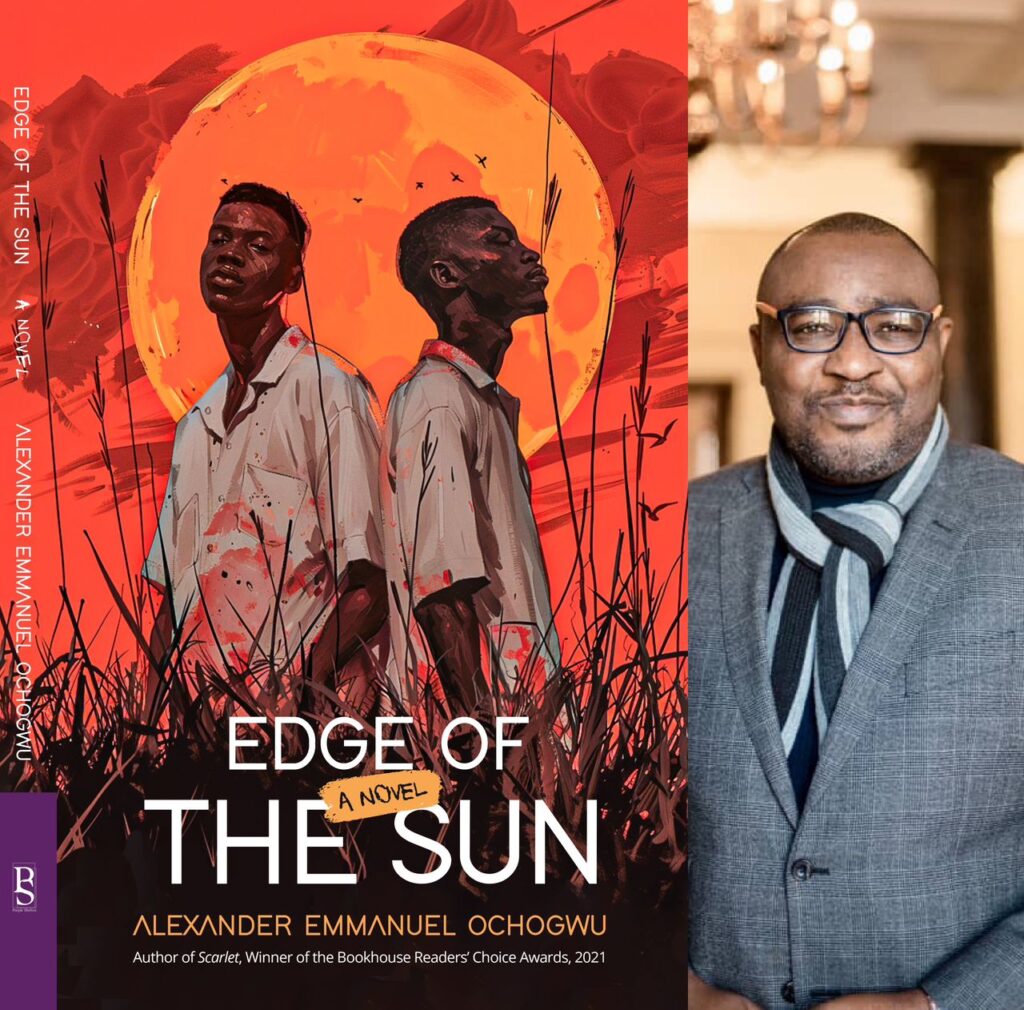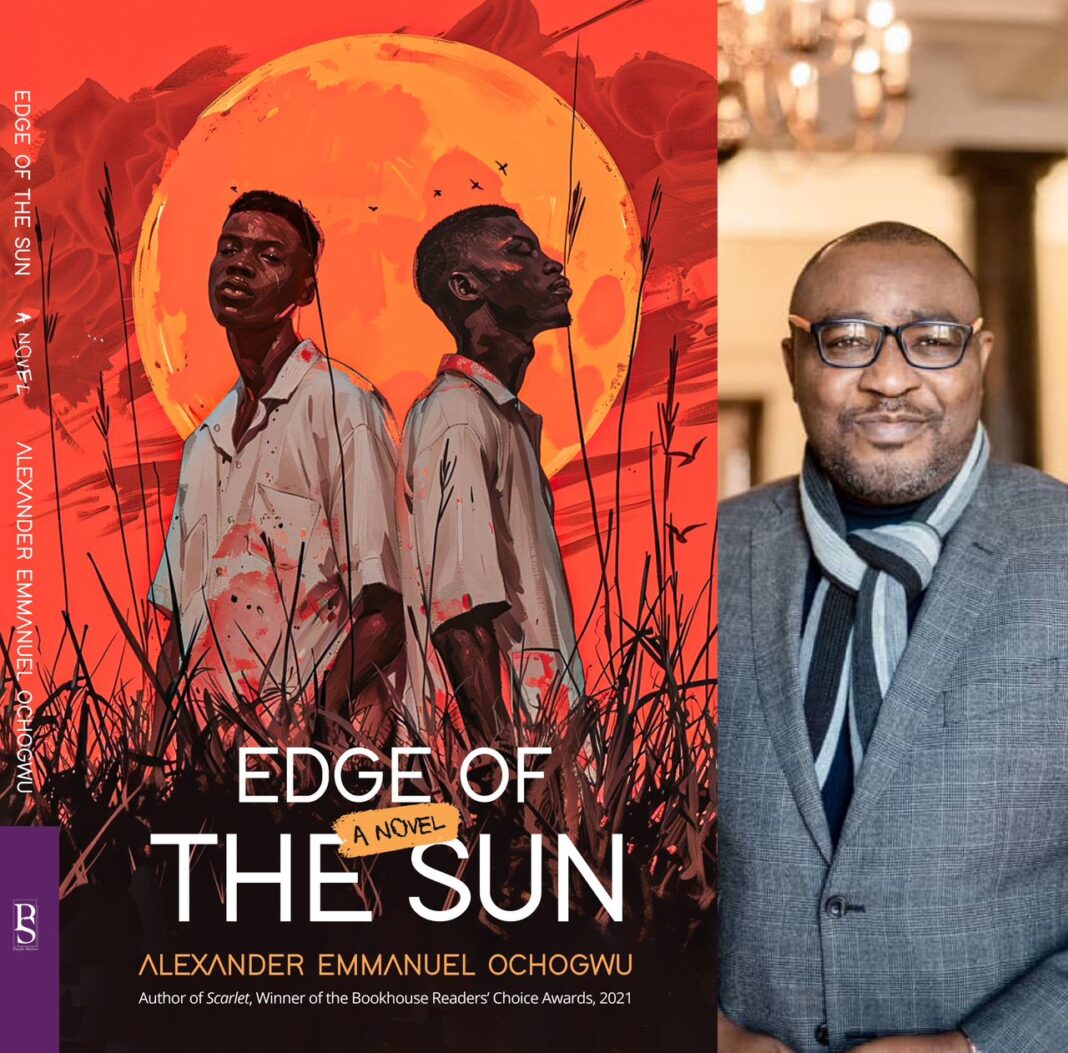
“Intervention Strategies for the Boy Child in the Twenty-First Century”
A Review of Dr. Alexander Emmanuel’s Edge of the Sun
By Professor Chris Kwaja
In a nation where conversations on insecurity are often dominated by guns,
numbers and political declarations, Dr. Alexander Emmanuel’s Edge of the Sun
reminds us that beneath every insurgency lies a bruised childhood. His novel is
not just fiction, but a quiet revolution that turns the mirror of violence toward
our collective conscience. It compels us to ask how Nigeria’s boys such as Sim,
Jaja, Little Abdul and countless others like them, become the raw material for
conflict.
As someone who has worked across policy, research and field operations in
peace and security, I recognize Edge of the Sun as more than a story— it is a
strategic reflection. It captures, through narrative, what policy documents often
fail to translate into empathy: that insecurity in Nigeria is sustained not only
by weapons but by wounds. Emmanuel’s decision to approach national
security through fiction is both bold and timely. It expands the scope of softpower engagement by positioning literature as a tool of social intelligence,
deradicalization and identity reconstruction.
The Novel as Security Mirror
At the heart of Edge of the Sun is the journey of two boys—Sim and Jaja—
whose lives are shaped by a nation in moral disarray. Through their eyes, we
see a generation raised amid broken families, political greed and the corrosion
of community values. The story moves between Lagos, Bodo and Gidan Rana,
revealing the layered geography of violence in Nigeria: urban corruption, rural
decay and militant extremism. Each setting functions like a security case study,
demonstrating how unaddressed local conflicts evolve into national crises.
In Bodo, cult violence erupts between the Bowe Boys and Aye Boys, mirroring
the real dynamics of gang networks that grow around environmental
degradation and oil theft in the Niger Delta. Emmanuel’s decision to locate the
story in this context is deliberate: it links economic marginalization with the
moral injury of youth. Sim’s forced relocation from Lagos to Bodo after his
mother’s abduction becomes a descent from comfort into chaos and,
symbolically, from innocence into radicalization.
What follows is not simply a coming-of-age story but a sociology of recruitment.
Sim and Jaja, drawn into cult life, experience the false brotherhood and
adrenaline that extremist groups offer in real life, which are belonging, identity
and revenge. Their transformation illustrates a crucial truth of conflict studies:
no one is born violent; violence is socialized. The novel’s genius lies in its ability
to dramatize this process with human empathy rather than condemnation.
From Radicalization to Redemption
Emmanuel’s fiction takes a decisive turn when Sim and Jaja encounter
Professor Uzoba, an academic who rescues them through education and
therapy. Uzoba’s work resembles what peace practitioners call a communitybased deradicalization model: identifying at-risk youth, isolating them from
violent influences and providing cognitive and moral rehabilitation. His
intervention mirrors the real-world gaps in Nigeria’s counter-extremism
strategy.
The Professor’s philosophy is straightforward—violence can be unlearned
through knowledge, dialogue and purpose. By sending Sim and Jaja to
university, Uzoba restores their agency. Later, when they establish Phantom
City, a rehabilitation centre offering counselling, medical care and skills
training to former cultists and abused children like Little Abdul, the narrative
completes its cycle of transformation.
From a policy perspective, Phantom City is not just a fictional institution; it is a
prototype for what our deradicalization system could become if humanized. It
shows that effective intervention must blend psychological healing with
education and reintegration. It also recognizes that community-driven
solutions often succeed where bureaucratic programmes stall.
Lessons for Nigeria’s Deradicalization Framework
Nigeria’s Operation Safe Corridor (OSC) represents one of Africa’s most
ambitious attempts at rehabilitating ex-combatants. Yet, as various
assessments have shown, OSC struggles with weak community buy-in, limited
post-training opportunities and recurring stigma. In many cases, the
deradicalized are warehoused rather than reintegrated. Edge of the Sun
exposes these structural flaws, not through policy critique, but through the
lived experience of its characters.
Sim’s early indoctrination and later recovery illuminate the stages often
missing in government programmes: early-stage prevention and sustained
post-rehabilitation engagement. His story reinforces the need for continuumbased deradicalization, where prevention, transformation and reintegration are
treated as interlinked rather than sequential phases.
Equally important is the novel’s psychological insight. Little Abdul’s abuse by
his guardian represents the unseen traumas that feed cycles of violence.
Nigeria’s counter-extremism frameworks rarely prioritize mental health, yet
Emmanuel’s narrative insists that psychological recovery is the real front line.
Without addressing trauma, we are merely disarming individuals while leaving
their minds weaponized.
The Boy Child as Security Actor
Where the novel speaks most powerfully to national strategy is in its portrayal
of the boy child. Emmanuel’s young male characters—Sim, Jaja, Little Abdul
and Priye—are not just victims of conflict; they are mirrors of a neglected
demographic. Contemporary security data show that boys aged 10–18 in
conflict zones face the highest risk of recruitment, sexual abuse and
displacement. Yet, Nigeria’s child-protection and peacebuilding policies rarely
distinguish their specific vulnerabilities.
Edge of the Sun demands that we re-examine the boy child as a strategic
population group. It proposes that early mentorship, education and cultural
engagement are the most effective counter-insurgency investments a state can
make. The rehabilitation of Sim and Jaja, guided by Uzoba and later Ebiye,
becomes an allegory for what inclusive national security could look like: one
that treats knowledge as defence and empathy as deterrent.
Culture as Counter-Narrative
One of the novel’s lasting metaphors is its title. “Edge of the Sun,” adapted
from the Hausa phrase Inna karshin rana, symbolizes standing on the
boundary between darkness and illumination. For Nigeria, this metaphor is
national. We are perpetually at the edge—between fragility and resilience,
despair and possibility. Emmanuel’s writing suggests that the choice to step
into light begins with culture.
With increasing exploitation of digital propaganda by extremist groups to
radicalize youth, literature becomes a counter-narrative weapon. Edge of the
Sun proves that fiction can compete with ideology by offering meaning, hope
and reflection. It calls on the state to invest in creative education, arts therapy
and storytelling platforms in conflict-affected communities. These are not
luxuries; they are long-term security measures.
Bridging Literature and Policy
Reading Edge of the Sun, I was reminded that national security is not achieved
through force alone but through the creation of humane alternatives.
Emmanuel’s background as a military officer gives his storytelling unusual
credibility. He writes not from imagination alone, but from observation—
showing how every conflict is both external and psychological.
In academic terms, the novel articulates what I often describe as “the moral
economy of peace.” This refers to the collective belief systems and social norms
that either sustain or undermine stability. By portraying the redemption of
violent youth through compassion and education, Emmanuel maps the
contours of that moral economy. His fiction thus becomes a contribution to
Nigeria’s non-kinetic security doctrine.
The novel’s realism also cautions against complacency. While Uzoba and Ebiye
represent idealistic interventions, their successes depend on local ownership.
For real-world policymakers, this means designing deradicalization initiatives
that are not externally imposed but co-created with communities. It also
underscores the need for legislative frameworks to secure funding, ensure
transparency and protect both beneficiaries and facilitators.
Toward a New Security Imagination
If there is one overarching insight from Edge of the Sun, it is that every society
must decide what to do with its damaged youth. We can either recycle them
into prisons and militias or re-imagine them as citizens of peace. The
establishment of Phantom City in the novel is emblematic of the second
choice—it symbolizes a nation’s willingness to heal itself.
In today’s Nigeria, where violence is decentralized and state authority often
fragmented, Emmanuel’s vision is profoundly relevant. It tells us that
preventing the next wave of extremism requires investment not in weapons but
in wellness; not in punishment but in purpose.
To operationalize this vision, I propose three priorities drawn from both policy
experience and the moral architecture of Emmanuel’s fiction:
- Develop a National Framework for Boy-Child Resilience—a cross-sectoral
policy linking education, mental health and peacebuilding at the community
level. - Institutionalize Literary and Arts-based Counter-Narratives within national
deradicalization programmes. Creative writing and storytelling should become
tools of civic re-education. - Reform Reintegration Systems to include psychosocial support, mentorship
and community sensitization—ensuring that returnees are accepted, not
alienated.
In conclusion, Edge of the Sun is both an artistic triumph and a policy
challenge. It reminds us that the future of Nigeria’s security lies not in the
accumulation of arms but in the cultivation of empathy. Through his
storytelling, Dr. Alexander Emmanuel transforms literature into a form of
strategic influence—one capable of doing what conventional policy cannot:
healing the unseen wounds of a nation.
Professor Chris Kwaja is a Professor of International Relations and Strategic
Studies, Country Director, United States Institute of Peace (Nigeria) and the
Special Envoy on Security to the Executive Governor of Plateau State



















